Building Camaraderie for Veterans: Highland Capital Management
“T he Center for BrainHealth has created a world-class environment for researchers to pursue advancements in cognitive health,” said Michael Gregory, CIO and Global Head of Highland Alternative Investors. “Their pioneering research was reason enough for our recent partnership, but it was their ability to translate this research into cognitive therapies for former military personnel through its Brain Performance Institute that truly warranted our financial support.”
When veterans leave military service, many of them are leaving the most cohesive, helpful and reliable network they’ve ever experienced. With new experiences, wisdom and skills, they are leaving their familiar brothers and sisters in arms to embark on a journey in uncharted territory as they transition back to civilian life.
“In the military, you are serving your country, but in combat, your focus is simplified to the warrior to your left and your right,” said Mike Rials, former Marine Corps sergeant and head of training at the Center’s Brain Performance Institute. “In the service, you have a sense of purpose and a built-in group of individuals who are your mentors, your brothers, your sisters and your best friends who will give and have given their lives for you, if necessary. But that purpose and trust are difficult to emulate or replace when you come home.”
Thanks to a $1 million gift from Highland Capital Management, the Center for BrainHealth’s new Brain Performance Institute will have a dedicated Highland Warrior Lounge, where active duty service members, veterans, and military spouses and caregivers can gather, unwind, and unite in camaraderie.
“We were really drawn to the idea of creating a zen-like room specifically for warriors and their families, a place to relax and socialize before and after trainings,” Gregory said.
In October, the Center for BrainHealth will celebrate the ground breaking of its state-of-the-art Brain Performance Institute – the cutting edge facility dedicated to translating leading-edge science to scalable solutions for the public at large. Thanks to private
philanthropy, the Warrior Initiative was established in 2012 to provide high performance brain training to current and former military service men and women and their families. This patriotic endeavor has inspired new partners like Highland Capital Management to support the Institute’s building campaign.
“I’m excited for our friends at Highland Capital Management to meet the warriors who will spend hours in this room sharing stories and transforming their lives,” said KeeShaun Coffey, former Navy religious program specialist and head of business development for the Warrior Training Team. “The Highland Warrior Lounge will serve as a launching point for our veterans and their families to reach their maximum cognitive capabilities through SMART, our signature brain training program.”
In addition to the Highland Warrior Lounge, the Brain Performance Institute will organize and host five Highland Capital Warrior Reunions. Warriors who have participated in the Brain Performance Institute programs will be invited back to reconnect, network and return for supplementary brain boosting sessions months and even years after their initial training.
“We look forward to inviting our military heroes back to the Institute to engage with one another, interface with their clinicians and receive incremental training,” Gregory said. “Highland Capital Warrior Reunions will be a forum for warrior families to gather, participate and connect to a place that has become very meaningful to a lot of folks. We are grateful to be a part of this inspiring initiative and proud that our gift will enhance the lives of warriors for years to come.”
2
Understanding the Brain: Prominent U.K. Scientist Joins BrainHealth Team

3
Enrich Your Mind: Dean Promotes Rapid Brain Translation
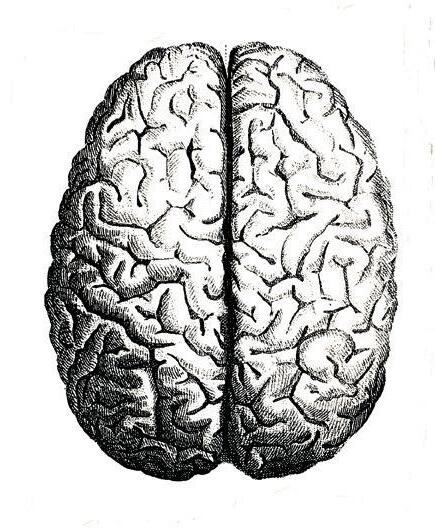
4
Alzheimer’s Update: Potential Biomarker for Alzheimer’s Disease
Volume 2, Fall 2015 | c e N ter F or B rai N h ealth at t he u N iversity o F t e X as at D allas
Michael Gregory, CIO and Global Head of Highland Alternative Investors |
BRAIN
Photo: Roger Peters
CENTRAL
Progress in brain health is undeniable, but are you leveraging the latest tools, habits and lifestyle choices to extend your brain health and amplify your brainpower?
Probably not. But, why? Once discoveries are made through research, it can take at least 20 to 40 years before the findings trickle down to applications and medical practices that improve people’s lives.


We say that’s not good enough.
That is why we are breaking ground on the first facility of its kind, solely focused on delivering scientifically validated programs that increase brain performance, enhance brain resilience and incite brain regeneration across the lifespan.
The Center for BrainHealth’s Brain Performance Institute at UT Dallas will serve as headquarters for brain research translation, taking the latest findings and immediately putting them into practice, making them available to the public, in person and virtually.
We are pioneering to bring solutions to some of the nation’s top brain concerns, including sports-related concussions, diseases and disorders such as the earliest stages of Alzheimer’s, and teens and adults with autism. We are empowering current and former military service members to transition into civilian life whether they have suffered a traumatic brain injury and/or post-traumatic stress disorder or just want better brain health. We are equipping teens struggling in school with forward-thinking learning skills and building innovative brainpower in future leaders on graduate school, undergraduate, and community college campuses across the country.
Despite the great ability to diagnose and treat problems when something goes wrong with the brain, our knowledge of what can be done to build stronger brain health has been limited until recently. Our brain is the only major part of our body that we only think about in injury and disease. No Longer.
Our goal for the new Brain Performance Institute is to build more than a new headquarters. It is to transform the way we take action toward advancing our most valuable organ’s health. To hasten the day all Americans have access to the information, techniques and treatments they need to harness the tremendous potential of their own brains, a latent potential we have not even begun to tap.
Dean Promotes Rapid Brain Translation

Bert Moore is more than our Dean; he is our visionary leader, humanitarian, and friend. For his enduring commitment and dedication to advancing life-enhancing brain study, the Center for BrainHealth with the UT Regents has established an endowed chair -the Bert Moore Chair in BrainHealth -- to permanently honor him.
of establishing the Center for BrainHealth from the glimmer of the first idea to the fruition of its doors opening to its futuristic vision of brain health for all.”
Chapman continued, “Dean Moore cheers us on to achieve the most we can to educate future brain scientists and clinicians, to break new ground in brain health discoveries, but most of all to put a human face as the pivotal driver behind our research endeavors – to improve lives.”
UNDERSTANDING the BRAIN
Prominent U.K. Neuroscientist Joins the BrainHealth Team
“Understanding how the brain works and improving brain performance is key to quality of life,” said T. Boone Pickens, the Texas energy executive who has been a major underwriter of the Center. “The Center for BrainHealth is developing breakthroughs in this field. I like being involved with people who are on the forefront of discovery that will change the future for the better. It’s clear they are committed to bringing the best talent on board to achieve their objectives, and their partnership with Dr. Ian Robertson truly exemplifies that fact.”
business at the Center for BrainHealth will be to investigate the possibility of enhancing its high performance brain training programs through neural engineering.
“To be able to recruit Dr. Robertson to our BrainHealth team is one of the greatest coups of talent,” said Sandra Bond Chapman, Ph.D., Center for BrainHealth founder and chief director. “Ian is respected as a world leader in advancing, building, and measuring brain resilience and its regenerative capacity.”
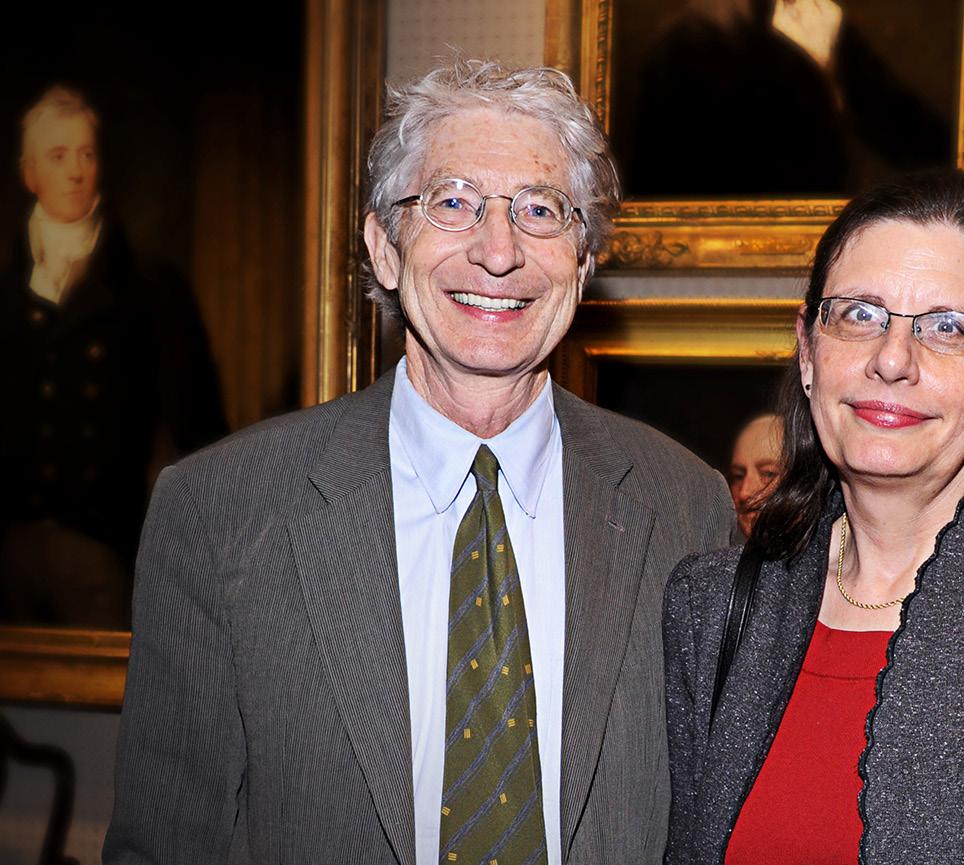
expositor of the values and promises of the brain sciences, and will bring a powerful portfolio of talents to augment the scientific strength of the Center and its educational outreach efforts as well.”
Robertson was inspired to become more deeply involved with the Center after accepting an invitation to speak at its annual lecture series made possible by The Container Store.
Since 1989, Dean Moore has led the rapid growth and expansion of the School of Behavioral and Brain Sciences (BBS) at The University of Texas at Dallas, of which the Center for BrainHealth is part. His commitment to ensuring that students profit from the research underway while also encouraging innovation to expand the range of brainrelated studies has led to a dramatic increase in interest in neuroscience and put UT Dallas on the map as a leader in the field. During his 26-year tenure, the number of BBS students has risen from 500 to more than 2,400, partnerships between University departments have flourished and the development and expansion of existing and new brainburgeoning hubs of innovation have taken root.
“For all my years as a professor, Dean Moore has been an anchor, a super-powering fuel, and a calm leader in the clamor and in the consensus,” said Sandra Bond Chapman,Ph.D., founder and chief director at the Center for BrainHealth and Dee Wyly Distinguished University Professor in the School of Behavioral and Brain Sciences at UT Dallas.
“He encouraged, mentored, critiqued and inspired every stage
“So much of what is learned in brain science stays in science,” said Dr. Bert Moore. “It’s rare for practitioners and scientists to work in conjunction, translating the latest advances into programs to improve the lives of individuals. That’s what makes the Center for BrainHealth unique.”
“Dean Moore possesses the unique qualities of being a great mentor, visionary leader and one of the kindest human beings I have ever met,” said John Hart, Jr., M.D., medical science director at the Center for BrainHealth and Jane and Bud Smith Distinguished Chair. “I have learned more about being a better person, leader and teacher from him than any other mentor have had. I am privileged to call him my friend.”
Dean Moore stepped down as dean September 1. With the permanent endowed chair in his name at the Center for BrainHealth, his legacy will inspire the explorers and innovators in the field for generations to come.

“For his wise counsel, innovative spirit and steadfast support, we are forever grateful,” said Chapman. “We will deeply miss him as Dean, but his footprint is indelibly ingrained into our DNA.”
CENTER GOINGS-ON
Young Professionals Make $25,000 Gift for Mindfulness Research to Treat Depression

The Think Ahead Group (TAG) awarded $25,000 to Lyndahl Himes to study the effectiveness of mindfulness training to treat depression. Depression affects more than 350 million people worldwide. Himes, a Center for BrainHealth researcher and cognitive neuroscience graduate student, is seeking to uncover a way to treat it without reliance on prescription medication. Mindfulness training is a non-invasive practice that encourages a person to focus on the moment, without producing any thoughts or sensations. Himes will study the extent to which mindfulness training reverses the depression-related atrophy of the hippocampus, an area of the brain critical to emotional functioning. Himes hopes to validate mindfulness training as a low cost and side effect-free alternative to prescriptive treatments. Each year TAG, a young professionals organization, raises funds through membership and its annual Kentucky Derby Party in May to support Center for BrainHealth research. TAG members voted to fund Himes’ study from a pool of proposals.
“Everyone knows someone who has been or will be affected by depression at some point in their lives,” explained Preston Roush, TAG co-president. “We are pleased to support a research project with such promise and potential to reach a large population in need of life-enhancing brain health.”
Eric
Sandi Chapman, Ph.D. Founder and Chief Director, Center
for BrainHealth
Bennett, CPA Executive Director, Brain Performance Institute
World-renowned neuropsychology expert, Ian Robertson, Ph.D., will become the T. Boone Pickens Distinguished Scientist at the Center for BrainHealth. Known for his translational research into human attention, brain plasticity and rehabilitation, Robertson’s first order of
He will collaborate with Dr. Chapman and UT Dallas’ Biomedical Device Center director Rob Rennaker, Ph.D., to scope out various brain stimulation methods that may enhance attention, learning, and other brain functions. Roberston will explore multi-disciplinary approaches to advancing indices of brain health using various psychophysiological measures and will collaborate on neuroimaging studies.
“Dr. Robertson’s research accomplishments are impressively extensive and diverse,” said Hobson Wildenthal, Ph.D., UT Dallas president ad interim “He brings to the Center for BrainHealth not only his individual knowledge, insights, and creative research ideas, but also offers a very significant expansion of the Center’s international network of scientific advisors and collaborators. He is a very articulate and charismatic
“Dr. Chapman’s vision for fostering brain health through the development of nonpharmaceutical, cognitive neuroscience-based methods, chimes closely with my own interests, experience and background,” explains Robertson. “She has developed one of the few centers in the world that prioritizes this translational approach and has pulled together a fabulous team of scientists and clinicians to help her realize it. My first visit in February convinced me that this is a place where I could work with like-minded colleagues in an atmosphere of great possibility and development.“
He continued, “There is an incredible sense of possibility that exists at the Center and UT Dallas in general, the sense that if you have a good idea, then we can probably find a way to put it into operation.”
Robertson is currently the Chair of Psychology at Trinity College Dublin and was the founding director of Trinity College Institute of Neuroscience.
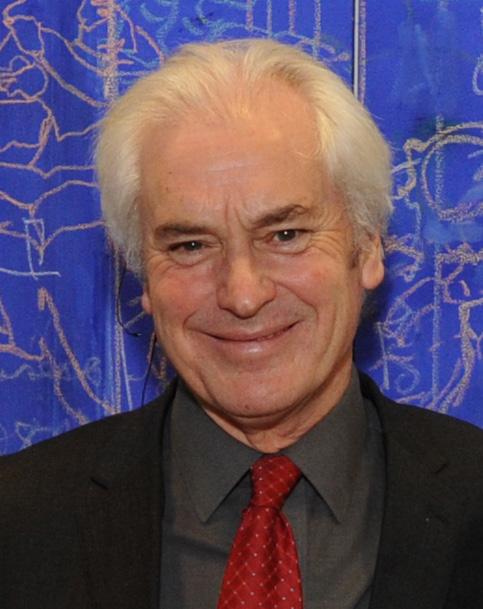
Study Reveals Brain Network Responsible for Cognitive Changes in Multiple Sclerosis
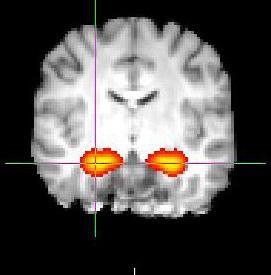
Approximately half of the 2.3 million individuals living with MS experience changes in cognition such as impaired concentration, attention, memory, and judgment, but the underlying brain basis for these effects has been largely elusive. New findings published in Neuropsychology reveal that decreased connectivity between network-specific brain regions are to blame for the central deficit common to the various cognitive changes associated with MS, slowed cognitive speed. Researchers at the Center for BrainHealth, in collaboration with UT Southwestern Medical Center, found individuals with MS exhibit weaker brain connections between the dorsolateral prefrontal cortex and posterior brain regions compared to healthy controls. The researchers believe that the diminished connections are likely the result of decreased white matter surrounding neurons in the brain.


“While white matter is essential to efficient network communication, white matter degradation is symptomatic of MS. This study really highlights how tightly coupled connectivity is to performance,” explained BrainHealth principal investigator Bart Rypma, Ph.D. The study recruited 29 participants with relapsing-remitting MS and 23 age- and sex-matched healthy controls. Study lead author Nicholas Hubbard, a doctoral candidate at BrainHealth, and Dr. Rypma are continuing to investigate the physiology of white matter to better understand cognitive speed reductions in MS and healthy aging.
Study Finds Nicotine Changes Marijuana’s Effect on the Brain
Approximately 70% of marijuana users also smoke tobacco, yet few studies have included tobacco users in marijuana research. Center for BrainHealth’s Francesca Filbey, Ph.D., Director of Cognitive Neuroscience of Addictive Behavior, and her team recently published a study in the journal Behavioural Brain Research, exploring the effects on the brain among marijuana users who also use nicotine. The study found an unexpected relationship between the size of the hippocampus, a region of the brain associated with memory and learning, and memory performance in individuals who use both substances; the smaller the hippocampal size, the greater the memory function compared to others in the marijuana and nicotine-using group. The team also found an association between numbers of cigarettes smoked per day; the greater the number, the smaller the hippocampus and the better the memory performance. In contrast, hippocampal size of non-users predicted a direct relationship to memory function; the smaller the hippocampus, the poorer the memory performance. There were no significant associations between hippocampal size and memory performance in individuals who only use tobacco or only use marijuana. “We have always known that each substance is associated with effects on the brain and hypothesized that their interaction may not simply be a linear relationship. Our findings confirm that the interaction between marijuana and nicotine is indeed much more complicated due to the different mechanisms at play,” said Dr. Filbey. “Future studies need to address these compounding effects of substances.”
LETTER from the directors
2 ENRICH YOUR MIND:
“ Dean Moore has been an anchor, a super-powering fuel, and a calm leader in the clamor and in the consensus. ”
3
9 9 u c 9 6 10 46 47 3 40 40 40 47 47 23 40 7 7 4 5 23 py R L A P
Alzheimer’s Update
In a study published in the latest edition of the Journal of Alzheimer’s Disease researchers identify a specific variation in brain waves of individuals with amnestic mild cognitive impairment (aMCI), those at twice the risk of others in their age group of progressing to Alzheimer’s disease. The findings depict a pattern of delayed neural activity that is directly related to the severity of impairment in cognitive performance on a word finding task and may indicate an early dysfunction of progression to Alzheimer’s.
The potential diagnostic approach utilizes electroencephalogram (EEG) technology, a more affordable and non-invasive alternative to other available methods such as MRI or a spinal tap, to measure neural responses while participants access general knowledge and concepts.
“This is a promising start at looking at a group of MCI patients. The long-term goal is whether this can be applied to individual patients one day,” says study principal investigator John Hart, Jr., M.D., medical
science director at the Center for BrainHealth.


“The majority of EEG research in aMCI has focused on looking at the mind ‘at rest’, but we are looking at the brain while it is engaged in the object memory retrieval process. We think this might be more sensitive and more specific in pointing out certain cognitive deficits, in this case semantic memory, than other non-EEG methods available, because EEG reflects direct neural activity,” explained study lead author Hsueh-Sheng Chiang, M.D., Ph.D., a research doctoral student at the Center for BrainHealth at the time of the study. “This protocol could potentially provide complementary information for diagnosis of pre-dementia stages including MCI and identify neural changes that can occur in cases of Alzheimer’s disease.”
This work is in collaboration with Raksha Anand Mudar, Ph.D., from the University of Illinois at Urbana-Champaign, and researchers from UT Southwestern Medical Center and John Hopkins University School of Medicine.
Study funding was made possible by grants from the National Institutes of Health (RCI-AG035954, P30AG12300), RGK Foundation, Alzheimer’s Association New Investigator Grant (NIRG-11-173815), Berman Research Initiative at the Center for BrainHealth, and the Linda and Joel Robuck Friends of BrainHealth New Scientist Award.
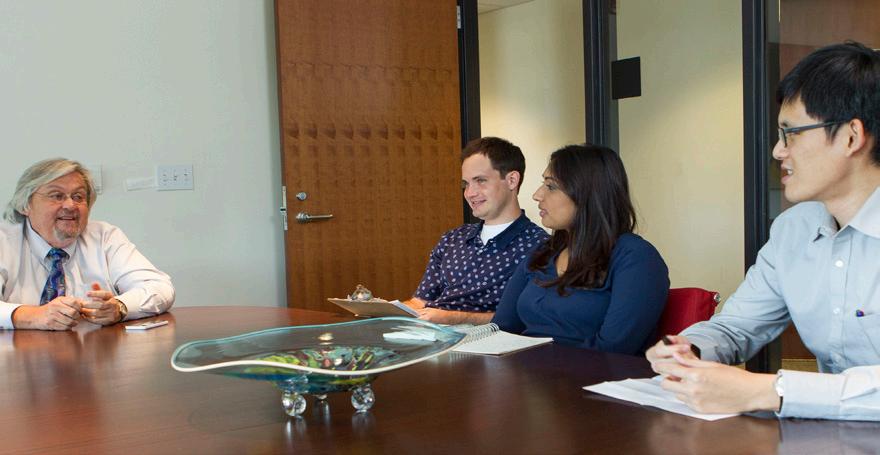
CENTER GOINGS-ON
AWARE AND SAMMONS CORPORATION HELP ADVANCE ALZHEIMER’S RESEARCH
The Alzheimer’s Association’s newly-released report was a call to action for Americans to redouble efforts to prevent and fight this progressive, and ultimately fatal, brain disease. With the number of people age 65 and older with Alzheimer’s expected to grow from 5.1 million to 7.1 million in the next ten years, two Dallas-based organizations are taking charge to further the Center for BrainHealth’s leading-edge research to change the trajectory of this devastating disease. The AWARE Fund of The Dallas Foundation and Sammons Corporation provided funding to advance Alzheimer’s-related research aimed at finding treatments that could potentially stave off Alzheimer’s disease in individuals at risk for dementia.
“As a company, we have seen firsthand the effects of Alzheimer’s disease on our parents and grandparents,” said Christine Anderson, director of corporate communications for Sammons Corporation. “By partnering with Center for BrainHealth, we are supporting advancements that will slow the progression of the disease so that future generations may live longer, healthier and happier lives.”
“Our grant review committee was very impressed with the Center for BrainHealth’s research in the area of slowing the progression of Alzheimer’s disease,” said Janet Broyles, president of AWARE. “It is important to us that we keep our grant dollars in the Dallas and North Texas communities, and that we support such fine non-profit
organizations as Center for BrainHealth, who are actively making a difference in the fight against Alzheimer’s disease.” The Center’s research focus lies with those faced with mild cognitive impairment (MCI), a state in between normal aging and Alzheimer’s disease; a previous randomized clinical trial was aimed at determining whether strategy based cognitive training could significantly slow disease progression.
Preliminary findings suggest that eight hours of strategy-based cognitive training improves brain function, including strategic attention and abstraction in individuals with MCI. With support from AWARE and Sammons Corporation, BrainHealth researchers will now add a session of brain stimulation, a small electrical charge delivered to specific brain areas, before each training session. Additionally, the project will use imaging technology to measure change in brain energy metabolism and to measure global brain blood flow and connectivity.
“By combining this targeted neurostimulation device with our proven high performance brain training, we hope to prime the brain and enhance plasticity to incrementally increase brain health and performance,” said Sandi Chapman, Ph.D., founder and chief director of the Center for BrainHealth. “We are grateful to Sammons Corporation and AWARE for their commitment to improving the brain’s resilience and better understanding markers of brain health and decline.”
Daily
With Dr. Xiaosi Gu’s groundbreaking approach to understanding the complexity of the brain, BrainHealth will be home to one of only four computational psychiatry laboratories in the world and will pioneer research breakthroughs by bringing together experts in neuroscience, psychiatry, decision sciences and computational modeling to quantitatively define problems in psychiatric disorders. Doing so will help to inform objective psychiatric assessments and treatment plans based on an individual’s biology.
Dr. Gu’s recent work, published in the Proceedings of the National Academy of Sciences ( PNAS ), suggests that belief is as important as biochemistry in addiction, implying that what an individual thinks about the act of engaging with a drug and its subsequent effect on the brain and body has major implications in how the brain responds to the drug.
2016 Lecture Series
The Brain: An Owner’s Guide |
February 2 | David Gelles, Mindful Work: How Meditation Can Transform Business
February 9 | Miguel Nicolelis, M.D., Ph.D., Brain-Machine Interfaces: From Basic Science to Neurological Rehabilitation
February 16 | Adam Gazzaley, M.D., Ph.D., Video Games: Innovative

Approaches to Enhance Brain Health at Any Age

February 23 | John Cryan, Ph.D., Food for Thought: How Your Gut Changes Your Mind
will once again deliver up-to-the-minute brain health research straight from renowned leaders in the field every Tuesday night in February.
X iaosi G u , P h .D. N
ew B rai N h ealth F aculty M e MB er
4
A lthough no conclusive test exists to predict who will develop Alzheimer’s, new research from the Center for BrainHealth is attempting to identify a potential biomarker that could offer a more complete picture of who is most at risk.
Non-Profit U.S. Postage Paid Richardson, TX 75080 Permit No. 108 2200 West Mockingbird Lane Dallas, TX 75235 Anonymous Alzheimer’s Association AWARE Emy Lou & Jerry Baldridge Berman Research Initiative at the Center for BrainHealth Lucy & Henry Billingsley Pam & John Borders Jean Ann Brock BvB Dallas Carry the Load Dianne Cash Communities Foundation of Texas The Container Store Corrigan-Goddard Foundation Dallas Foundation Teresa & David Disiere Barbara & Steve Durham Ann & Chuck Eisemann Debbie & Jim Francis Friends of BrainHealth Dimmitt Garrison Foundation Glenn Gehan Hamon Charitable Foundation Highland Capital Management Lyda Hill Hillcrest Foundation Hillwood Investments The Hoglund Foundation Kathryn “Kim” Hiett Jordan Samara Kline & Andy McCarthy La Quinta Inns & Suites Tamara Mattison & Mark Floyd Eugene McDermott Foundation Meadows Foundation The Moozie Foundation Sammye & Mike Meyers National Institute on Drug Abuse National Institutes of Health National Multiple Sclerosis Society Maureen & Mike Parks Katherine & Bob Penn The Sarah & Ross Perot, Jr. Foundation T. Boone Pickens PlainsCapital Corporation Gail & Bill Plummer Rees-Jones Foundation RGK Foundation Jennifer & Peter Roberts Linda & Joel Robuck Rouse Family
Rowling
Sammons
Sapphire
SCP
Southwest
W. Washburne
in
Williams
Thank you to the numerous donors whose support funded the initiatives appearing in this edition of Brain Matters
Foundation
Foundation
Enterprises, Inc.
Foundation
Foundation Diane & Scott Sealy The Simmons Family Foundation Jane & Bud Smith
Airlines Gayle & Paul Stoffel Claudia & Jerry Stool Think Ahead Group Bert Headden & Cindy Thomas The Tolleson Family Foundation Lisa & Kenny Troutt Ray
Nancy & Bob Wilbur In memoriam of Joel Williams, Jr., who gave with Linda Evans
honor of Betty Lu
Ellen Wilson Meredith & Jack Woodworth Dee Wyly
T he Brain: An Owner’s Guide the Center’s annual sell-out lecture series made possible by the generosity and vision of The Container Store, T icke T s on s ale D ecember 1 • V isi T c en T er F or b rain H eal TH . org
Brain Health |
CenterForBrainHealth.org
214.905.3007
CENTER FOR BRAINHEALTH’S BRAIN PERFORMANCE INSTITUTE
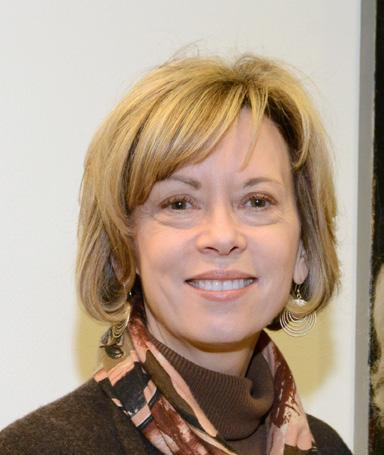

IMPACT REPORT
Breaking New Ground, Fall 2015


Next month Center for BrainHealth at The University of Texas at Dallas will break ground on its Brain Performance Institute — the first facility of its kind, solely focused on translating and delivering scientifically validated programs that increase brain performance, enhance brain resilience and incite brain regeneration across the lifespan.






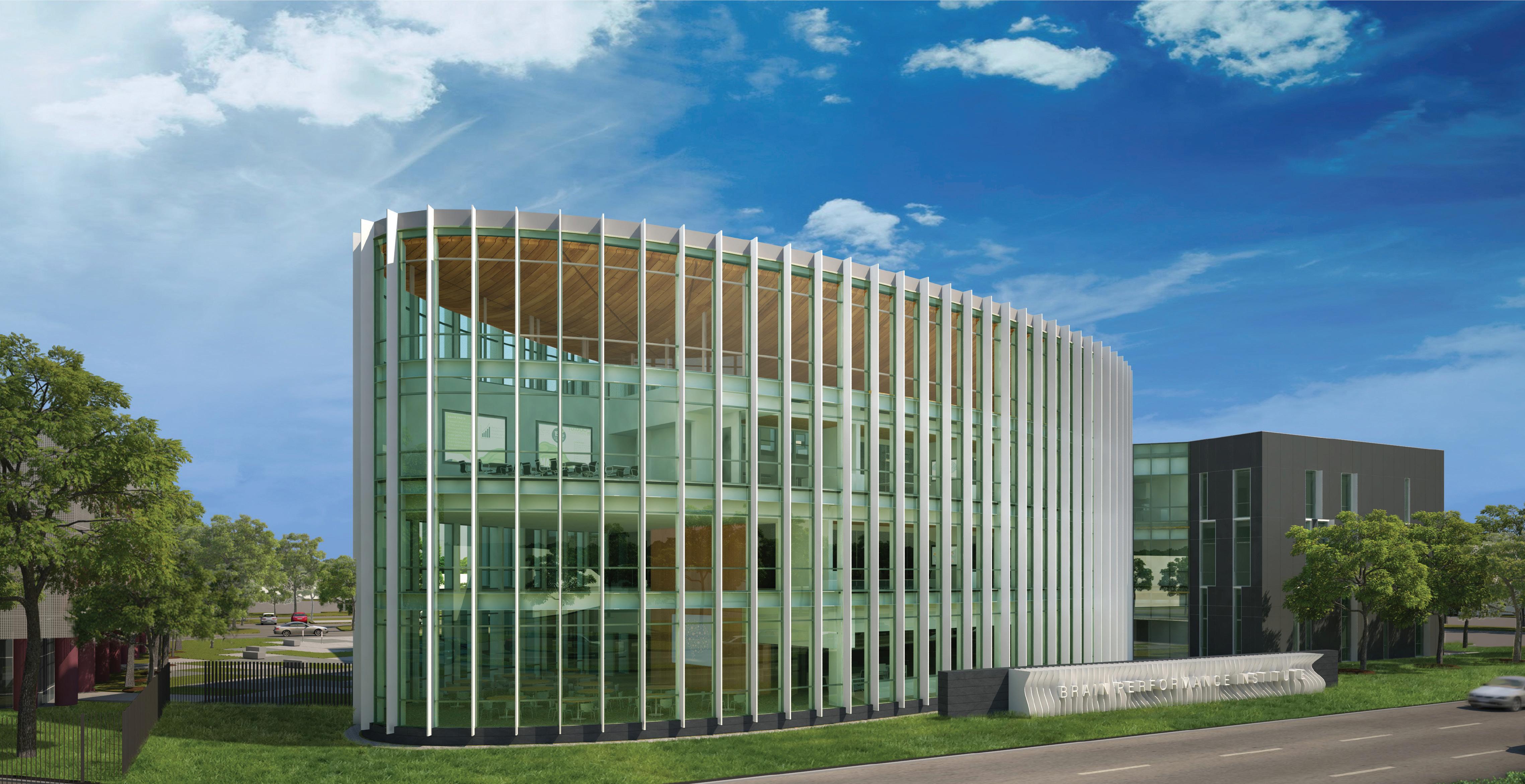
Proclaimed “one of the jewels of the UT System” by UT System Board of Regents Vice Chairman R. Steven Hicks, the Brain Performance Institute’s mission is to provide the information—and the tools—the public needs to enhance their brain health at all stages of life. Initial Brain Performance Institute offerings will include high performance brain training for people of all ages, virtual reality training for teens and adults on the autism spectrum, and BrainHealth Physicals.
“Understanding how the brain works and improving brain performance is key to quality of life. The Center for BrainHealth is developing breakthroughs in this field.”
T. BOONE PICKENS Texas Energy Executive




From school children to corporate executives and warriors to athletes, we can all change our minds.

“We never stop to think how we might use our brains to enhance our energy, health, emotions or our clarity and creativity of thought. The SMART program lets us understand the potential methods of using our brains.”
People who have made this vision possible
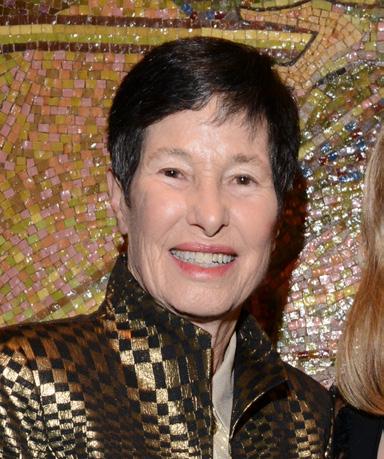 Bill & Minnie Caruth
Patty & James Huffines
Dianne Cash
Terry & Bob Rowling
Debbie & John C. Tolleson
Bill & Gail Plummer
Debbie Francis, Jan & Trevor Rees-Jones
Lisa Simmons
Paul & Gayle Stoffel
Linda & Joel Robuck
Lyda Hill
Jane & Bud Smith
LUCY BILLINGSLEY Entrepreneur, SMART graduate
Bill & Minnie Caruth
Patty & James Huffines
Dianne Cash
Terry & Bob Rowling
Debbie & John C. Tolleson
Bill & Gail Plummer
Debbie Francis, Jan & Trevor Rees-Jones
Lisa Simmons
Paul & Gayle Stoffel
Linda & Joel Robuck
Lyda Hill
Jane & Bud Smith
LUCY BILLINGSLEY Entrepreneur, SMART graduate
“Training from the Brain Performance Institute has helped me in my classes and to get better grades. It changed how I thought about myself and made me look differently at school.”
LAUREN
8th Grade Student
Our reach goes far beyond Texas
40,000
Warriors, First Responders, Military Spouses & Caregivers, Executives & Teens.
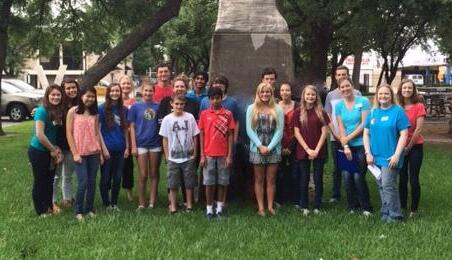
And the number is growing exponentially.
Thanks to private philanthropy, programs for warriors, first responders, and military spouses and caregivers are provided at no cost to them. State and private funding have provided programs to students in more than 106 middle schools.

“I struggle with relationships and mathematical tasks. The strategies I have learned here will help me with both of those things. I wish I had done this sooner!”
OTTO
First Responder, Army Veteran
Targeted programs offered at the Brain Performance Institute

Our brains are adaptable. Repairable. And trainable.
With the creation of the Brain Performance Institute, we are able to ensure that life-enhancing, scientifically validated programs will be available — both at this location and beyond — via mobile and virtual training teams.
Randomized clinical trials have shown that Center for BrainHealth-developed programs offered through the Brain Performance Institute have been documented to cultivate the following:
“It gave me hope after a traumatic situation, and I think it would do the same for others going through difficult experiences. Also my mother has Alzheimer’s, so that is a concern. The BrainHealth Physical and SMART training help to address any worries you might have, as well as give you many tools to continue improving your brain health.”
SELKE Mother of a veteran
14% INCREASE in neural connectivity 8%–12% INCREASE in global brain blood flow 86% IMPROVEMENT in the social brain for those on the autism spectrum 30% INCREASE in standardized test scores 50% GAIN in higher-level reasoning
Teens and Adults • Social Cognition • Military Veterans, Service Members, Spouses and Caregivers • Mild Cognitive Impairment • Post-Traumatic Stress Disorder • Professionals in High-Stress Environments • Autism • Traumatic Brain injury • Alzheimer’s Disease
Healthy
High Performance Brain Training for Warriors Marine Corps Base Hawaii — Kaneohe Bay
SUSAN
We’ve already helped unlock the brain potential of more than
Photo: Kristen Wong

































 Bill & Minnie Caruth
Patty & James Huffines
Dianne Cash
Terry & Bob Rowling
Debbie & John C. Tolleson
Bill & Gail Plummer
Debbie Francis, Jan & Trevor Rees-Jones
Lisa Simmons
Paul & Gayle Stoffel
Linda & Joel Robuck
Lyda Hill
Jane & Bud Smith
LUCY BILLINGSLEY Entrepreneur, SMART graduate
Bill & Minnie Caruth
Patty & James Huffines
Dianne Cash
Terry & Bob Rowling
Debbie & John C. Tolleson
Bill & Gail Plummer
Debbie Francis, Jan & Trevor Rees-Jones
Lisa Simmons
Paul & Gayle Stoffel
Linda & Joel Robuck
Lyda Hill
Jane & Bud Smith
LUCY BILLINGSLEY Entrepreneur, SMART graduate


